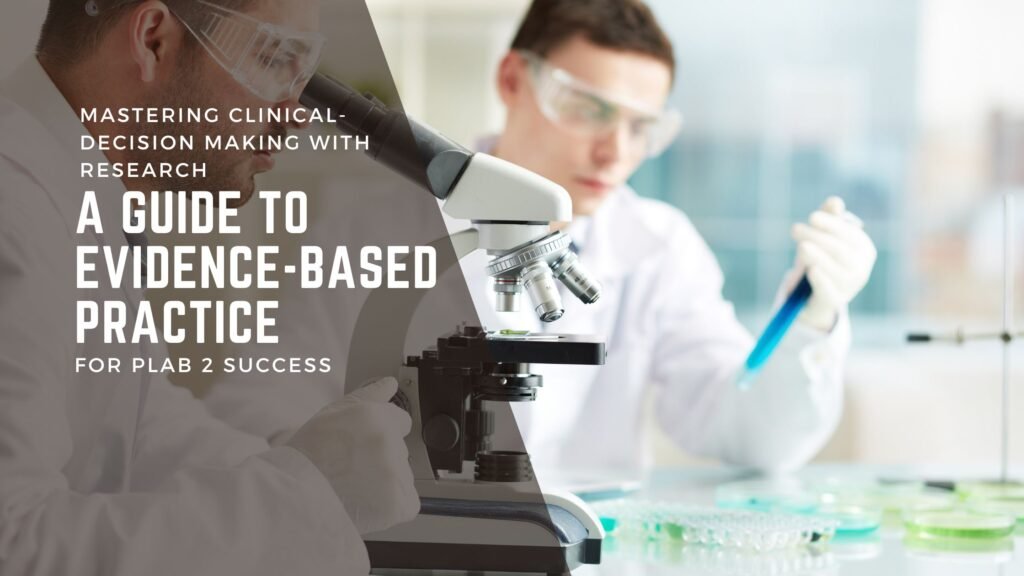Patient safety is paramount in healthcare, with millions suffering serious harm annually due to lapses in care (World Health Organization). For doctors aspiring to practice in the UK, proficiency in patient safety is not just a moral imperative but a professional necessity. The Professional and Linguistic Assessments Board (PLAB) 2 exam serves as a gateway for international medical graduates to demonstrate their readiness for UK practice. Central to this readiness is an understanding of clinical governance, a cornerstone of patient safety and PLAB 2 success.
What is Clinical Governance?
Clinical governance encompasses the systems and processes designed to ensure high standards of care delivery within healthcare organizations. At its core are principles of accountability, clinical effectiveness, and patient-centeredness. Through robust governance structures, healthcare providers strive to continually improve the quality and safety of patient care.
Accountability: Clinical governance emphasizes the responsibility of healthcare organizations and individuals to deliver safe and effective care. This involves clear lines of accountability, where healthcare professionals are accountable for their actions and decisions.
Clinical Effectiveness: Clinical governance promotes the use of evidence-based practice to ensure that healthcare interventions are effective in improving patient outcomes. By staying abreast of the latest research and guidelines, healthcare providers can deliver care that is both safe and clinically effective.
Patient-centeredness: Central to clinical governance is the recognition that patients should be at the heart of healthcare delivery. This involves actively involving patients in decision-making, respecting their preferences and values, and providing care that is tailored to their individual needs.
The Role of Clinical Governance in Patient Safety
Clinical governance frameworks play a pivotal role in safeguarding patient safety. By establishing clear standards of care, promoting risk management strategies, and fostering a culture of continuous improvement, clinical governance frameworks mitigate risks and enhance patient outcomes.
Standards of Care: Clinical governance ensures that healthcare organizations have in place clear standards of care that outline best practices and expectations for patient management. These standards are often informed by clinical guidelines and regulatory requirements, providing a framework for safe and effective care delivery.
Risk Management: Inherent in clinical governance is the recognition of the potential risks associated with healthcare delivery. Through risk management strategies such as incident reporting, root cause analysis, and proactive risk assessments, healthcare organizations can identify potential hazards and implement measures to mitigate them.
Continuous Improvement: Clinical governance fosters a culture of continuous improvement, where healthcare organizations strive to learn from both successes and failures. By encouraging reflection, feedback, and learning from adverse events, organizations can identify areas for improvement and implement changes to enhance patient safety.
Why is Clinical Governance Important for PLAB 2 Preparation?
In the PLAB 2 exam, candidates are assessed on their ability to apply clinical knowledge and skills to real-life patient scenarios. Patient safety features prominently in these assessments, with candidates expected to demonstrate their understanding of clinical governance principles.
Alignment with GMC Standards: The General Medical Council (GMC) sets the standards for medical practice in the UK, including expectations for patient safety and clinical governance. By demonstrating proficiency in clinical governance, PLAB 2 candidates align themselves with these standards and signal their readiness to practice safely in the UK.
Application in Practice: PLAB 2 assesses candidates’ ability to apply clinical knowledge and skills in the context of patient care. Understanding clinical governance principles is essential for making sound clinical decisions that prioritize patient safety and quality of care.
Professional Responsibility: As future medical practitioners, PLAB 2 candidates have a professional responsibility to prioritize patient safety. By integrating clinical governance principles into their preparation, candidates demonstrate their commitment to upholding the highest standards of ethical and professional conduct.
How to Incorporate Clinical Governance into PLAB 2 Preparation
To excel in the PLAB 2 course, candidates must integrate clinical governance principles into their study approach. This entails focusing on resources that emphasize patient safety, such as clinical guidelines and best practice recommendations. Additionally, practicing scenario-based questions that incorporate clinical governance considerations can help candidates familiarize themselves with the application of these principles in clinical practice.
Study Resources: Utilize resources that emphasize patient safety and clinical governance, such as reputable clinical guidelines, textbooks, and online courses. Familiarize yourself with key principles and concepts related to accountability, clinical effectiveness, and patient-centered care.
Practice Scenarios: Practice scenario-based questions that require you to apply clinical governance principles in the context of patient care. Pay attention to factors such as risk management, evidence-based practice, and communication skills, all of which are integral to patient safety.
Reflective Practice: Take time to reflect on your own practice and consider how clinical governance principles apply to your patient interactions. Identify areas for improvement and seek feedback from mentors or colleagues to enhance your understanding and skills.
Conclusion
In the pursuit of PLAB 2 success, aspiring doctors must prioritize their understanding of clinical governance principles. By embracing accountability, clinical effectiveness, and patient-centeredness, candidates not only enhance their chances of passing the exam but also contribute to safer healthcare delivery.
As you embark on your PLAB 2 journey, remember that clinical governance is not just a checkbox to tick but a guiding principle that underpins your practice. By integrating these principles into your preparation, you not only prepare yourself for success in the exam but also lay the foundation for a fulfilling and impactful career in medicine. As future practitioners, it is incumbent upon PLAB 2 candidates to uphold the highest standards of patient safety and quality care.

